Bibliography
- Pratchett, Terry: "Maskerade", Victor Gollancz, 1995
- Pratchett, Terry: "Feet of Clay", Victor Gollancz, 1996
- Pratchett, Terry: "Going Postal", Doubleday, 2004
Golems in Terry Pratchett's Discworld series are derived from golems in Jewish mythology; early forms of a clay robot, supposedly awakened by a spell or priestly words to do people's bidding.
Every golem has the magic writing inside its head, called the Chem; the Chem powers the golem, as well as programming its behavior. Pratchett's writing emphasises the similarity between golems and robots, especially golems made in Umnia or Three Laws Compliant golems. Their Chem restricts their behaviour, and is described in terms apparently identical to the Asimovian Three Laws of Robotics .
Although a golem's Chem is in full control of its behaviour on the Discworld, Chems are occasionally changed to suit a new function for the golem, whereas Laws of Robotics are treated as fundamental to a robot's mental constitution and are unmodifiable. So, for example, in the novel Going Postal , the protagonist Moist von Lipwig discovers the First Law inside Mr Pump (Pump 19) begins normally "A golem cannot harm a human being, nor through inaction allow a human being to come to harm", but has as an addendum "... Unless ordered to do so by a Duly Constituted Authority."
Feet of Clay sees a golem king, Meshugah, whose Chem has been made over-complicated, running to hundreds of laws. Meshugah therefore goes insane.
Like Hex, Golems are artificial life. They see themselves as possessions, and, while they desire freedom, have decided that they can only get this freedom by buying themselves (a previous attempt to get freedom by creating a king proved dangerously unsuccessful). The first free golem, Dorfl, had the plan to buy other golems and give them to themselves. Since then, the Golem Trust has been established to facilitate the freeing of golems.
Technically a charity, it refuses to accept donations from any other than freed golems, because the golems are clear they must free themselves by their own work. The Golem Trust buys golems with money earned by the free golems, and hires the acquired golems out in the same way as an agency might hire out butlers to the wealthy. The money earned in this way enables a Trust golem to eventually buy itself from the Trust and become free.
The hiring service is run by Miss Adora Belle Dearheart from a tiny office in Ankh-Morpork. She is intensely protective of the golems’ welfare. It is apparent that they are hired for Government purposes: Mr Pump is hired by the Patrician's office and programmed to act as Moist von Lipwig's probation officer, and later reprogrammed to capture Reacher Gilt.
Older golems often have somewhat Yiddish-sounding names, such as Dorfl, Meshugah, Bobkes, Shmata, and Klutz. More recently built golems simply have descriptions of the purpose they were created for, such as Stitcher, or Hammer, or Pump, often with an associated number detailing their workplace location. Traditionally they get "all the messy jobs".
The creation of new golems is illegal due to the ethical questions it raises. Many still exist, however, and destroying them is also ethically tricky. Golems are distrusted by many on the Discworld, particularly the undead, who dislike the fact they are (generally) more accepted, despite being less human.
Golems do seem to have some limited abilities to harm humans. In Going Postal , Mister Pump (AKA Pump Nineteen) has had the rule "A Golem May Not Harm A Human Being Or Allow A Human Being To Come To Harm" amended to add "... Except When Ordered To By Duly Constituted Authority." After his Chem is destroyed, Dorfl tells the Vampire Dragon King of Arms that Dorfl could crush him, essentially killing him, but will not because it would be immoral to do so.
In Making Money, Adora Belle Dearheart tells Lord Vetinari that historically, cultures did not build Golems who could kill, and this implies that even modifying the Chem would not make a Golem able to kill. Since the Umnian Golems had their Chem inscribed directly in their clay, and it could not be modified, perhaps most golems have the "cannot kill" stricture engraved directly in their clay before firing. Dorfl could be an exception: The whole top of his head was sheared off in his fight with Meshugah, perhaps destroying any strictures which were originally "hard coded".
Golems have, apparently spontaneously, formed the Ankh-Morpork volunteer fire brigade: Their volunteer operations are a moral contrast with previous human fire brigades who were paid commissions to put out fires and therefore attempted to ensure that there were fires for them to be paid for. When a fire is noted, all Golems abandon their current work (or return from wherever they go during their holy day) and converge onto the location. The Golems' approach to extinguishing a fire is to simply remove any burning or flammable materials from the building. Once the fire is isolated they stamp it out.
Originally, golems were unable to speak, and instead carried around a slate and chalk with which they wrote down whatever they wanted to say. Near the conclusion of Feet of Clay, Dorfl is rebaked with a tongue and gains the ability to talk. Since then, numerous other golems, especially free ones, have also been given voices. Like Death, those golems capable of speech have a distinctive mannerism; whereas Death's speech is represented by being printed all in small caps, transcriptions of golem speech capitalize the first letter of every word. When Golems write, their script is a corrupted version of the Hebrew alphabet altered to appear as Latin letters, which is possibly a reference to golems' origins in Jewish mythology. Golems also have their own language which is "said to be spoken by angels", and uses the Enochian alphabet.
In Making Money , 4000 golems are found by the Golem trust, headed by Adora Belle Dearheart. When brought to the city, a lot of discussion arises as to what should be done with them. These Golems' version of chems are actually baked into their bodies, not written on paper, so they cannot be freed. They do, however, possess much skill; they were able to create a city and sustain a civilization under the orders of their original creators. Thanks to a sequence of Umnian commands (translated by a deceased wizard), Moist von Lipwig gains the ability to control them. However, the economist Hubert Turvy notes that the golems would effectively render the entire population redundant, resulting in a crash of consumption that would beggar the city. After much discussion it is decided that, because of their worth, they are to be buried. Their worth would back the new paper currency of Ankh Morpork. It becomes known as the Golem standard.
Anghammarad features in the novel Going Postal . He is almost nineteen thousand years old, having been baked by the priests of Upsa in the Third Ning of the Shaving of the Goat. He was also given a voice. However, Upsa was destroyed by the explosion of Mount Shiputu. He then spent two centuries under a mountain of pumice, before it eroded away. He then became a messenger for the Fisherman Kings of the holy Ult. More recently, he delivered the decrees of King Het of Thut—until the land of Thut itself slid under the sea. He then spent nine thousand years in the deep ocean, before being netted by a fisherman. Having returned to civilization, he still carried the message warning Het that the sea goddess is angry and waited to deliver it (golems believe time is cyclical, by simply waiting Anghammarad would be able to go forward to King Het and deliver the missive).
He worked for the Ankh-Morpork Post Office in the honorary position of Extremely Senior Postman, before his briefly white-hot ceramic body was engulfed with very cold water while fighting a catastrophic fire in the post office building - the sudden massive cooling of his body by the water shattered him. When he reached the Dark Desert, he appeared as pure red "furnace heat" in the shape of his former body. Being incapable of boredom, he asked Death to allow him to remain at the entrance to the afterlife, equating an absence of tasks to perform with perfect freedom.
Dorfl is a golem on the Ankh-Morpork City Watch. He joined the Watch during the events of Feet of Clay , amid which he was set free by Captain Carrot, sustained considerable damage fighting the golem king, and was rebuilt to a considerable degree. He is later mentioned in Thud! as taking part in the Watch barricade between the dwarves and the trolls. He is the first truly free Golem, as Captain Carrot placed his own receipt of ownership in his chem, allowing Dorfl to 'own himself'.
Dorfl's rebuilding is a significant event, in terms of voice and personal belief system. His chem was destroyed in Feet of Clay, although he still managed to save Carrot from Meshugah because, as he put it, "Words In The Heart Can Not Be Taken." The repairs included being given a voice, but he was not issued a chem; instead, he began to "find his own words". Voices for golems had been considered blasphemous before Dorfl's argument with the Council of Churches, Temples, Sacred Groves, and Big Ominous Rocks. He quickly became the Disc's first ceramic atheist, to the displeasure of at least one god, and has been issued an official chit to label him "alive" to avoid interference in this state of affairs. He will believe in any god whose existence can be proved by rational argument, although none has yet been successful. A thunderbolt to the head is deemed wholly unconvincing (in Dorfl's own words, "I Don't Call That Much Of An Argument"). Fellow watchman and Omnian Constable Visit continues to present Om's case before him, and unlike most people, Dorfl welcomes the continued debate.
Dorfl speaks 'With The Beginning Of Every Word Being Capitalized', as do all golems granted speech, and, like most golems, he is quite literal in his choice of words. Some of his lines take a considerable amount of inspiration from RoboCop , such as his description of his own duties: "To Serve The Public Trust, Protect The Innocent, And Seriously Prod Buttock".
He is the apparent founder of the Golem Trust, although this is never conclusively stated. He is mentioned in Making Money as the first Freed Golem, which led to the Golem Trust.
In Feet of Clay , a group of golems originally attempted to gain their freedom by creating a king for themselves. They stole raw white clay from a troll potter, and used bits of their own to strengthen it. With the support of a sympathetic holy man and the curator of the dwarf bread museum (owner of an oven big enough to fit a golem), they succeeded in building and animating a king.
However, while making its chem, the golems put too many commands in its head, driving it slowly insane (this and the fact it hadn't been fired in a proper kiln lends a new spin to the term "half-baked"). Even worse, the golems did not provide their king with a means of opening its head to allow its chem to be altered. In the end, they covertly sold it to a candlemaker, who named it Meshugah (Yiddish, as well as Hebrew, for crazy or insane).
As part of Dragon King of Arms' plot to incapacitate the Patrician, Arthur Carry, the candlemaker used Meshugah to create poisoned candles. Both apparently viewed its lack of a voice as an asset to the plot, making it unable to leak information. However, the golem's tremendous productivity soon forced the candlemaker to lay off practically his entire workforce. Even worse, whenever Carry ran out of materials it would wander out into the streets and try to scream. Soon, it began killing the humans who had helped manufacture it.
The golems, connected to it through their clay, were aware of what it was doing, and their shame drove them to commit suicide. Officers Carrot Ironfoundersson and Angua von Uberwald confronted the candlemaker in his factory and were forced to fight Meshugah. They were saved only by the intervention of Dorfl, the first free golem, who, despite terrible bodily damage and the loss of his chem, managed to kill the king by destroying its head. Its last act was to smile and welcome death.
Unlike most golems, the king was built to resemble a human perfectly, like a statue, complete with molded-on crown. Due to being baked in an oven suited to dwarf bread rather than a proper pottery kiln, Meshugah's body was unstable, constantly cracking and resealing, occasionally leaving behind grey dust. Perhaps because of this instability, it was also able to reassemble itself when dismembered or broken, a trait shared by no other golem seen on the Disc thus far (though they can—and do—mend themselves, leading to their "gingerbread men" appearance over time). However, due to the beleaguered, insane state of its mind, it tended to put limbs on backwards and twitch crazily while walking.
While no golem is really female, no golem is really male either and when Miss Maccalariat, the head cashier at the Ankh-Morpork Post Office, demanded that only females could clean the female toilets, a golem was given a cotton blue print dress and a woman's name to do the job. Over time, largely due to "her" interaction with the counter girls, who frequently handed her rather old fashioned books on female etiquette, Gladys began to assume more feminine characteristics until, by Making Money , her employer, Moist von Lipwig, was fairly certain she had begun to develop a rather disturbing romantic obsession with him. Fortunately, Moist's fiancée, Adora Belle Dearheart, who understood that golems tended to believe what they read, cured her by handing her a "modern" book by a radical feminist. Appeared in Going Postal and Making Money .
Appeared in Going Postal . More commonly referred to as Mr. Pump, he received his name from his previous position, where he spent over two hundred years operating one of a series of underwater pumps. He claims to have had plenty to think about down there - pumping water, to be specific. He has since entered the employ of the Patrician, who uses him as a parole officer. He has been extremely successful in this, as he never needs to stop for sleep and can follow his target anywhere by tracking their Karmic signature. Due to the influence of the Patrician, Mr. Pump has an unusual behavior for a golem. He bends the rules, twists the truth, and (despite Moist Von Lipwig's protests) implies that he is capable of hurting and threatening people under proper authorities, if only in roundabout and uncomfortably vague ways - although as yet he has not actually harmed anybody apart from Lipwig whom he frequently knocks unconscious for his own safety.
The Original Red Army, a legendary fighting force of Agatean Legend, is said to have been created when the Great Wizard moulded some Earth into figures of soldiers, and infused them with lightning, animating them and also making them invincible warriors. They are made from terracotta, parodying the Terracotta Army. They apparently do not obey verbal orders, and can only be controlled when one dons some magical armour, in which case the entire army will mimic the actions of the armour-wearer who can also give them limited orders via a series of magical buttons on the armour. The only two people to have done so appear to be One Sun Mirror, the first Emperor of the Aurient and friend of the Great Wizard, and Rincewind, who discovered them by accident. They appear in Interesting Times .
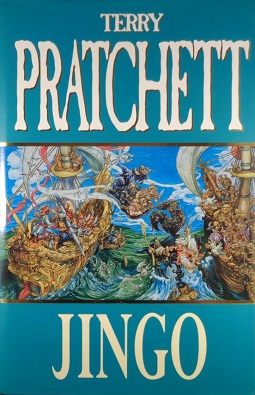
Jingo is a fantasy novel by British writer Terry Pratchett, part of his Discworld series. It was published in 1997.
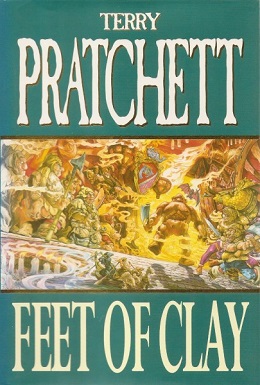
Feet of Clay is a fantasy novel by British writer Terry Pratchett, the nineteenth book in the Discworld series, published in 1996. The story follows the members of the City Watch, as they attempt to solve murders apparently committed by a golem, as well as the unusual poisoning of the Patrician, Lord Vetinari.
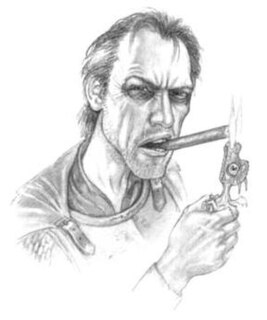
Samuel "Sam" Vimes is a fictional character in Terry Pratchett's Discworld series. Vimes is depicted in the novels as somewhere between an Inspector Morse-type 'old-school' British policeman, and a film noir-esque grizzled detective. His appearances throughout the Discworld sequence show him slowly and grudgingly rising through the ranks of both police force and society. As of his latest promotion, his full name and title is: "His Grace, His Excellency, The Duke of Ankh; Commander Sir Samuel Vimes": When serving as Ambassador for Ankh-Morpork, he is also referred to simply as "His Excellency", and is also nicknamed "Blackboard Monitor Vimes", "Vimes the Butcher/Butcher Vimes" and "Vetinari's Terrier" : According to his wife, Sybil, Vimes is recognised by many as Lord Vetinari's right-hand man.

The Colour of Magic is a 1983 comic fantasy novel by Terry Pratchett, and is the first book of the Discworld series. The first printing of the British edition consisted of only 506 copies. Pratchett has described it as "an attempt to do for the classical fantasy universe what Blazing Saddles did for Westerns."
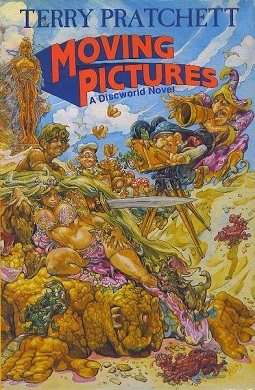
Moving Pictures is a fantasy novel by British writer Terry Pratchett, published in 1990, the tenth book in his Discworld series. The book takes place in Discworld's most famous city, Ankh-Morpork and a hill called "Holy Wood". It is the first Discworld novel to feature Mustrum Ridcully, Archchancellor of Unseen University, as a character.
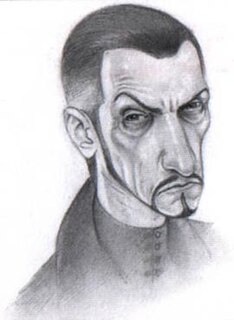
Lord Havelock Vetinari, Lord Patrician of the city-state of Ankh-Morpork, is a fictional character in Terry Pratchett's Discworld series, a series of forty-one books describing a parallel universe whose main world has reflections of our Earth. He is depicted as the ruler of the city-state of Ankh-Morpork. Vetinari is sometimes said to have been based on the Italian statesman and diplomat, Niccolò Machiavelli, but in fact favours a subtly different form of administration.

Men at Arms is a fantasy novel by British writer Terry Pratchett, the 15th book in the Discworld series, first published in 1993. It is the second novel about the Ankh-Morpork City Watch on the Discworld. Lance-constable Angua von Überwald, later in the series promoted to the rank of Sergeant, is introduced in this book. Lance-constable Detritus is introduced as a new member of the watch as well, though he had already appeared in other Discworld novels, most notably in Moving Pictures. Also notable is the only appearance of Lance-constable Cuddy.
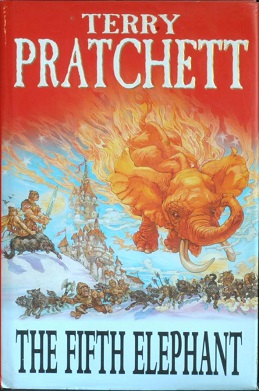
The Fifth Elephant is a fantasy novel by British writer Terry Pratchett, the 24th book in the Discworld series. It introduces the clacks, a long-distance semaphore system. The novel was nominated for the Locus Award in 2000.
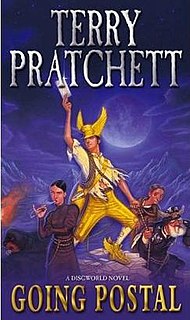
Going Postal is a fantasy novel by British writer Terry Pratchett, the 33rd book in his Discworld series, released in the United Kingdom on 25 September 2004. Unlike most of Pratchett's Discworld novels, Going Postal is divided into chapters, a feature previously seen only in Pratchett's children's books and the Science of Discworld series. These chapters begin with a synopsis of philosophical themes, in a similar manner to some Victorian novels and, notably, to Jules Verne stories. The title refers to both the contents of the novel, as well as to the term 'going postal'.
The Ankh-Morpork City Watch is the police force of the fictional city of Ankh-Morpork in the Discworld series by the English writer Terry Pratchett.
Moist von Lipwig is a fictional character from Terry Pratchett's Discworld series. He is the protagonist of the novels Going Postal, Making Money, and Raising Steam.
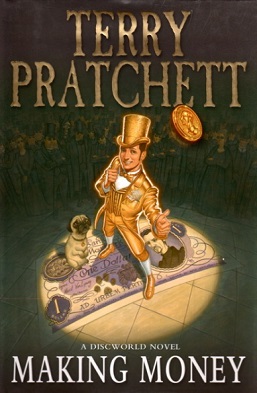
Making Money is a fantasy novel by British writer Terry Pratchett, part of his Discworld series, first published in the UK on 20 September 2007. It is the second novel featuring Moist von Lipwig, and involves the Ankh-Morpork mint and specifically the introduction of paper money to the city. The novel won the Locus Award for Best Fantasy Novel in 2008, and was nominated for the Nebula Award the same year.

Terry Pratchett's Going Postal is a two-part television film adaptation of Going Postal by Terry Pratchett, adapted by Richard Kurti and Bev Doyle and produced by The Mob, which was first broadcast on Sky1, and in high definition on Sky1 HD, at the end of May 2010.
The technology depicted in Terry Pratchett's Discworld novels takes two forms: magical and mechanical. Nearly all technology early in the series is at least partially magical, but in more recent books, a form of industrial revolution takes place, with numerous purely mechanical inventions being introduced. In Thud! ancient 'devices' of undisclosed origin and great power were introduced; it is not clear whether these are magical, mechanical, both or neither. Time-travel technology, the exact nature of which is usually unclear, is used by the History Monks. Most Discworld technologies have real-world equivalents, in function if not form.

Ankh-Morpork is a fictional city-state which features prominently in Terry Pratchett's Discworld fantasy novels.

Discworld is a comic fantasy book series written by the English author Terry Pratchett, set on the Discworld, a flat planet balanced on the backs of four elephants which in turn stand on the back of a giant turtle. The series began in 1983 with The Colour of Magic and continued until the final novel The Shepherd's Crown was published in 2015, following Pratchett's death. The books frequently parody or take inspiration from J. R. R. Tolkien, Robert E. Howard, H. P. Lovecraft, Charles Dickens and William Shakespeare, as well as mythology, folklore and fairy tales, often using them for satirical parallels with cultural, political and scientific issues.
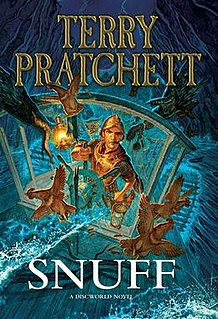
Snuff is the 39th novel in the Discworld series, written by Terry Pratchett. It was published on 11 October 2011 in the United States, and 13 October 2011 in the United Kingdom. The book is the third-fastest-selling novel in the United Kingdom since records began, having sold over 55,000 copies in the first three days.
This article contains brief biographies for characters from Terry Pratchett's Discworld series. This list consists of human characters. For biographies of noted members of the Discworld's "ethnic minorities", see the specific articles for those races. Some character biographies are also listed in articles relating to the organisations they belong to. For further Discworld character biographies, see the table below.
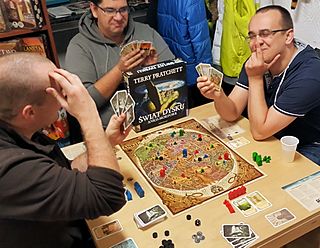
Discworld: Ankh Morpork is a board game set in the largest city-state in Terry Pratchett's Discworld. Designed by Martin Wallace and Treefrog Games, the game revolves around the playing of cards and placing minions onto the board. Each player attempts to meet the win condition for the personality that they randomly and secretly selected at the start of the game. The game features many characters from the Discworld series but players do not need to have any knowledge about the books.

Raising Steam is the 40th Discworld novel, written by Terry Pratchett. It was the penultimate one published before his death in 2015. Originally due to be published on 24 October 2013, it was pushed back to 7 November 2013. It stars Moist von Lipwig, and features the introduction of locomotives to the Discworld, and an entirely new character.